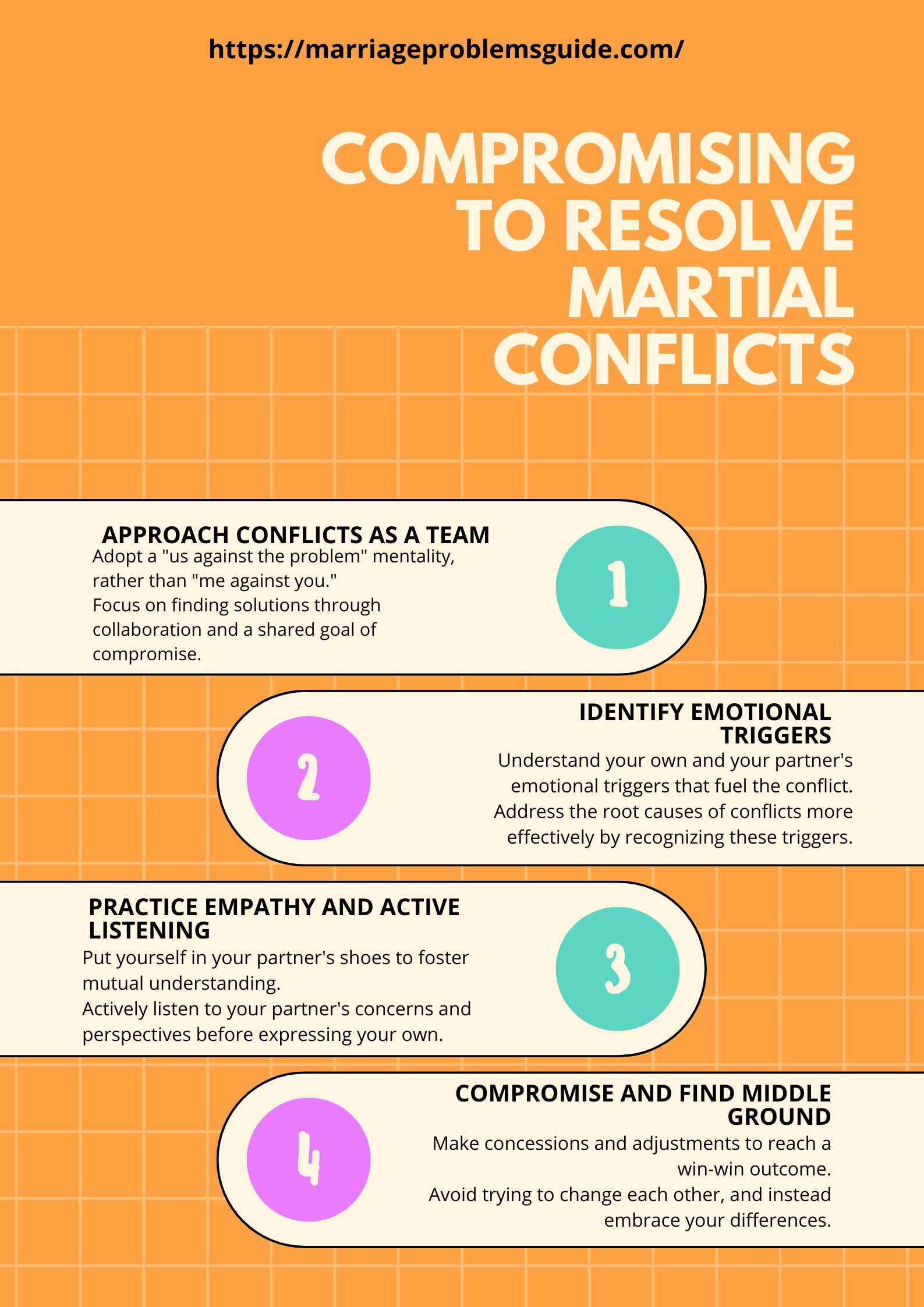Marital conflicts are an inevitable part of any relationship, as two individuals with unique personalities, backgrounds, and expectations come together to build a life.
While these disagreements can be challenging, they also present an opportunity for growth and strengthening the bond between partners.
By embracing a spirit of compromise, couples can navigate these conflicts and emerge with a deeper understanding and appreciation for one another.
Key Takeaways:
- Recognize and understand the common sources of marital conflicts, such as pet peeves, intimacy issues, lack of quality time, financial disagreements, and trust/jealousy problems.
- Approach conflicts as a team, focusing on finding solutions rather than placing blame.
- Identify your own and your partner’s emotional triggers to address the root causes of conflicts more effectively.
- Practice empathy, active listening, and open communication to foster mutual understanding and facilitate compromise.
- Take initiative to address issues, rather than waiting for your partner to make the first move.
- Compromise by finding middle ground and making concessions, aiming for a win-win outcome.
- Address one issue at a time, instead of trying to tackle multiple conflicts simultaneously.
- Accept and appreciate the inherent differences between you and your partner.
- Communicate openly about your emotional triggers to help your partner better understand and support you.
- Avoid using insults or making assumptions during conflicts, as these can escalate the situation.
- Find inspiration and guidance from the teachings of the Qur’an and the example of the Prophet Muhammad (peace be upon him) on maintaining emotional intimacy, romance, and mutual understanding in marriage.
- Engage in exercises and activities, such as identifying individual needs, practicing active listening, and regularly checking in as a couple, to improve conflict resolution skills.
Understanding Common Marital Conflicts
Marital conflicts can arise from a variety of sources, and it’s important to recognize the most common issues that couples face. By understanding the root causes of these conflicts, couples can better address them and find effective solutions.
1. Pet Peeves and Incompatible Habits
Every individual has their own unique quirks, habits, and preferences that can sometimes clash with their partner’s.
These “pet peeves” can range from simple things like a messy living space to more complex issues like different sleep schedules or communication styles.
Recognizing and addressing these incompatibilities through compromise can help couples find a middle ground.
2. Intimacy and Sexual Differences
Intimacy and sexual compatibility are crucial components of a healthy marriage, but couples may often experience differences in their desires, preferences, or expectations.
These disparities can lead to frustration, resentment, and conflict if not addressed with empathy and understanding.
Compromising on intimacy and sexual needs can help maintain a fulfilling and mutually satisfying relationship.
3. Lack of Quality Time Together
In the hustle and bustle of daily life, couples can sometimes neglect to prioritize quality time with each other. Whether it’s due to work commitments, family obligations, or simply a lack of effort, the absence of dedicated couple time can erode the connection and lead to conflicts.
Compromising on schedules, activities, and priorities can help couples make time for each other and strengthen their bond.
4. Financial Disagreements
Money is a common source of conflict in marriages, as couples navigate shared financial responsibilities, savings goals, and spending habits. Disagreements over budgeting, debt management, or investment decisions can create tension and resentment.
Compromising on financial matters, while also maintaining open communication and mutual understanding, can help couples find a balanced approach.
5. Jealousy and Trust Issues
Trust is the foundation of any healthy relationship, and when it is breached or threatened, it can lead to conflicts fueled by jealousy, insecurity, and fear.
Addressing the root causes of these trust issues through open communication, empathy, and a willingness to compromise can help couples rebuild and strengthen the trust in their relationship.
Strategies for Resolving Conflicts Through Compromise
When faced with marital conflicts, it’s essential to approach the situation with a collaborative mindset, focusing on finding solutions rather than placing blame.
By employing effective strategies for conflict resolution, couples can navigate these challenges and emerge with a stronger, more resilient relationship.
1. Approach as a Team, Not Adversaries
It’s important for couples to remember that they are on the same team, working together to resolve the issue at hand. Adopting a “us against the problem” mentality, rather than “me against you,” can help couples approach the conflict with a cooperative spirit and a shared goal of finding a mutually beneficial solution.
2. Identify Your Emotional Triggers
Understanding your own emotional triggers and those of your partner can be a powerful tool in conflict resolution.
By recognizing the underlying emotions that fuel the conflict, such as fear, insecurity, or resentment, couples can address the root causes more effectively and find ways to compromise that address these deeper needs.
3. Practice Empathy and Active Listening
Effective communication is crucial in resolving marital conflicts, and this involves both expressing your own thoughts and feelings, as well as actively listening to your partner’s perspective.
Practicing empathy, putting yourself in your partner’s shoes, and truly hearing their concerns can help foster mutual understanding and pave the way for compromise.
Take Initiative to Address Issues
Rather than waiting for the other person to make the first move, taking the initiative to address conflicts can demonstrate a willingness to work towards a solution.
This could involve starting the conversation, proposing potential compromises, or taking concrete steps to address the underlying issue.
4. Find Middle Ground Through Compromise
The essence of conflict resolution in marriage is the ability to find a middle ground through compromise. This may involve both partners making concessions, adjusting their expectations, or finding creative solutions that meet the needs of both individuals.
The goal is to find a win-win outcome where both partners feel heard and respected.
5. Address One Issue at a Time
Trying to tackle multiple conflicts simultaneously can quickly become overwhelming and lead to further tension. Instead, focus on addressing one issue at a time, giving it the attention and effort it deserves before moving on to the next.
This approach allows couples to tackle problems more effectively and avoid getting bogged down in a web of unresolved conflicts.
6. Accept and Appreciate Differences
Recognizing and accepting that you and your partner may have inherent differences is an important step in resolving conflicts. Rather than trying to change each other, focus on understanding, respecting, and even appreciating these differences.
By embracing your uniqueness, you can find ways to compromise and accommodate each other’s needs.
7. Communicate Openly About Triggers
Open and honest communication is essential for effective conflict resolution. This includes being willing to share your emotional triggers with your partner, so they can better understand your reactions and work with you to find ways to address them.
Similarly, being receptive to your partner’s triggers can help create a more empathetic and understanding environment.
8. Avoid Insults and Assumptions
During the heat of a conflict, it can be tempting to lash out with hurtful words or make assumptions about your partner’s intentions.
However, this can quickly escalate the situation and erode the foundation of trust and respect. Refrain from using insults or making assumptions, and instead focus on addressing the issue at hand in a constructive manner.
Seeking Inspiration from the Qur’an and Sunnah
As Muslims, we can find guidance and inspiration in the teachings of the Qur’an and the example of the Prophet Muhammad (peace be upon him) when it comes to navigating marital conflicts and finding compromises.
1. Emotional Intimacy and Affection in Marriage
The Qur’an emphasizes the importance of emotional intimacy and affection in marriage, describing the relationship between spouses as one of “love and mercy” (Qur’an 30:21).
This foundation of love and compassion can help couples approach conflicts with understanding and a willingness to find common ground.
2. Maintaining Romance and Physical Intimacy
The Prophet Muhammad (peace be upon him) encouraged his companions to maintain a sense of romance and physical intimacy in their marriages, recognizing the vital role these elements play in a healthy relationship.
By prioritizing these aspects, couples can foster a deeper connection and find ways to compromise on any intimacy-related conflicts.
3. Fostering Love, Mercy, and Mutual Understanding
The Qur’an also instructs us to “live with them [your spouses] in kindness” (Qur’an 4:19) and to “pardon and overlook” (Qur’an 64:14) the faults of our partners.
By cultivating an attitude of love, mercy, and mutual understanding, couples can approach conflicts with empathy and a willingness to find solutions that benefit both individuals.
Real-Life Examples of Successful Conflict Resolution
Examining real-life examples of how couples have navigated and resolved their conflicts can provide valuable insights and inspiration for our own relationships.
1. Revisiting Past Conflicts and Lessons Learned
Reflecting on how you and your partner have addressed conflicts in the past can help you identify effective strategies and areas for improvement. By revisiting these experiences, you can gain a better understanding of your communication dynamics and find ways to build on your successes.
2. Focusing on Effective Communication
Couples who have successfully resolved their conflicts often attribute their success to a strong emphasis on effective communication. This includes actively listening to each other, expressing their needs and concerns clearly, and finding ways to compromise that address the underlying issues.
3. Achieving Win-Win Outcomes Through Compromise
Ultimately, the hallmark of successful conflict resolution in marriage is the ability to find compromises that leave both partners feeling heard, respected, and satisfied.
By focusing on win-win solutions, couples can navigate their differences and emerge with a strengthened bond and a renewed commitment to their relationship.
Exercises and Activities for Couples
Incorporating practical exercises and activities into your marriage can help you and your partner better understand each other’s needs, improve communication, and develop effective strategies for resolving conflicts through compromise.
| Exercise | Description |
|---|---|
| Identifying Individual Needs and Wants | Individually, write down your top 5 needs and wants in the relationship. Then, share and discuss these with your partner, finding ways to accommodate each other’s priorities. |
| Active Listening and Perspective-Taking | During a conflict, practice active listening by paraphrasing your partner’s concerns and perspectives, before sharing your own. Aim to truly understand their point of view. |
| Brainstorming Solutions and Compromises | Together, generate a list of potential solutions and compromises to address the conflict at hand. Evaluate each option and work towards a mutually satisfactory agreement. |
| Regular Couple Check-Ins and Reflections | Set aside regular time to check in with your partner, discuss any ongoing issues, and reflect on the progress you’ve made in resolving conflicts through compromise. |
Conclusion
Navigating marital conflicts through compromise is an essential skill for any couple seeking a healthy, long-lasting relationship.
By understanding the common sources of conflict, employing effective strategies for resolution, and drawing inspiration from the teachings of the Qur’an and Sunnah, couples can learn to approach their differences with empathy, understanding, and a shared commitment to finding solutions.
Remember, conflict is a natural part of any relationship, and how you choose to handle it can ultimately strengthen or weaken your bond. Embrace the opportunity to grow together, compromise, and emerge with a deeper appreciation for one another.











